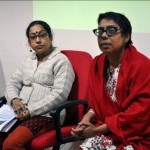 New Delhi, 10th February, 2014:- Apne Aap Women Worldwide, a registered charitable trust in India committed to work towards the empowerment of girls and women today organized its seventh session of ‘Terrace Talks’ at their head-office at India International Centre, New Delhi. The talk was chaired by Swati Chakraborty, Head-Monitoring & Evaluation at Apne Aap Women Worldwide. The discussion revolved around ‘Field realities from denotified tribes’.
New Delhi, 10th February, 2014:- Apne Aap Women Worldwide, a registered charitable trust in India committed to work towards the empowerment of girls and women today organized its seventh session of ‘Terrace Talks’ at their head-office at India International Centre, New Delhi. The talk was chaired by Swati Chakraborty, Head-Monitoring & Evaluation at Apne Aap Women Worldwide. The discussion revolved around ‘Field realities from denotified tribes’.
The ongoing study on the educational status of de-notified Tribes by Apne Aap Women Worldwide in the states of Delhi, Rajasthan, Odisha, Jharkhand, Bihar and West Bengal clearly shows that these communities are still treated as outsiders by society and discriminated and victimized by authorities. Suspicion and traditional stereotyping (as criminal) is still a standard yardstick with which these communities are looked at. This is due to both conventional belief as well as ignorance about them among the authorities as well as the general public.
The session further delved around the findings of the study, where Swati and the team found that young girls were seen as a financial resource and often kept as security with brothel owners for a specified time period against a specified amount in case of familial dispute. It threw light on the incidents when poor families have been forced to use their daughters more than once. There are endless stories of extreme exploitation of young girls and women .One member of Kanjar communities told the study team: doh hi chiz to bikte hain. ek hain aurat r ek hain zameen. hum logo ke paas to zameen hain nehi—toh aurat hi bech te hain.Aur keya kar sakte hain. (Two things can be sold—one is women and other island. We do not have land so we sell our woman. What else we can do).
Participating in the discussion Abhilasha Kumari, Director Apne Aap Women Worldwide said, “Many of these denotified tribes practice inter-generational prostitution which is the extreme form of exploitation of young girls. Being an anti trafficking grassroots organization, Apne Aap came into the picture largely because we wanted to create an impact about this practice. We consider that every child that is put into prostitution is trafficked. We realized most of the people didn’t know about denotified tribes so we took the help from ICSSR. ICSSR has supported this research and provided us with authentic information and evidence. These findings will help us to develop, strategies and policy formulation for the development of these communities”.
Elucidating on the denotified tribes study , Swati Chakraborty highlighted how across the states, despite being extremely poor and low on all human resources indices, this study found that de-notified communities are not entitled to the various government schemes meant for the poor and backward communities. There is abject poverty among them across states. Police find it convenient to hold these communities responsible for any crimes both in rural and urban areas. Speaking at the session, she said “It is very easy to show through statistics how many children are not attending school, but the reason why they are not going or what are the factors that are pushing them away can only be known by having a field experience and by conducting studies of this kind”.
The session concluded with the audience discussing various measures to implement the much needed reforms towards the cause of these tribes.